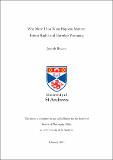Files in this item
Why more than what happens matters : robust rights and harmless wronging
Item metadata
| dc.contributor.advisor | Cruft, Rowan | |
| dc.contributor.advisor | Pummer, Theron Gene | |
| dc.contributor.author | Bowen, Joseph | |
| dc.coverage.spatial | [8], 220 p. | en_US |
| dc.date.accessioned | 2020-10-12T10:51:47Z | |
| dc.date.available | 2020-10-12T10:51:47Z | |
| dc.date.issued | 2020-07-27 | |
| dc.identifier.uri | https://hdl.handle.net/10023/20770 | |
| dc.description.abstract | This thesis examines a range of cases in which it appears one’s rights against harm are violated by another’s behaviour, even though this behaviour has done one no harm. Call these cases of harmless wronging. These cases raise a serious problem for most theories of rights, though the problem is most pronounced on the Interest Theory of Rights. According to that theory, rights necessarily protect their holder’s wellbeing. At first glance, one might think that the person’s wellbeing cannot be said to be protected by the right in cases of harmless wronging because they are not harmed in such cases—so, the necessary condition set for the ascription of a right is not satisfied. I offer a novel, welfare-based explanation of why we have rights against harmless wrongs, the Safety Condition. This holds that for someone to hold a right against us that we not perform some action, we look to whether our performing that action could easily leave them sufficiently worse off to place us under a duty. In addition to extensional accuracy, one reason for this focus on modality—on what might have been—is that it removes an objectionable form of luck from rights. And, it matters that rights do not depend on luck in this objectionable way for this requires that we, as duty-bearers, are sensitive to others’ wellbeing: that we do not only not harm others, but that we could not easily have harmed them. | en_US |
| dc.language.iso | en | en_US |
| dc.publisher | University of St Andrews | |
| dc.rights | Creative Commons Attribution-NonCommercial-NoDerivatives 4.0 International | * |
| dc.rights.uri | http://creativecommons.org/licenses/by-nc-nd/4.0/ | * |
| dc.subject | Rights | en_US |
| dc.subject | Directed duties | en_US |
| dc.subject | Harm | en_US |
| dc.subject | Wronging | en_US |
| dc.subject | Pre-emption | en_US |
| dc.subject | Risk | en_US |
| dc.subject | Harmless wronging | en_US |
| dc.subject.lcc | BJ1411.B7 | |
| dc.subject.lcsh | Human rights--Philosophy | en |
| dc.subject.lcsh | Law--Philosophy | en |
| dc.subject.lcsh | Right and wrong | en |
| dc.title | Why more than what happens matters : robust rights and harmless wronging | en_US |
| dc.type | Thesis | en_US |
| dc.contributor.sponsor | Arts and Humanities Research Council (AHRC) | en_US |
| dc.contributor.sponsor | Society for Applied Philosophy | en_US |
| dc.type.qualificationlevel | Doctoral | en_US |
| dc.type.qualificationname | PhD Doctor of Philosophy | en_US |
| dc.publisher.institution | The University of St Andrews | en_US |
| dc.publisher.department | The University of Stirling | en_US |
| dc.identifier.doi | https://doi.org/10.17630/10023-20770 |
The following licence files are associated with this item:
This item appears in the following Collection(s)
Except where otherwise noted within the work, this item's licence for re-use is described as Creative Commons Attribution-NonCommercial-NoDerivatives 4.0 International
Items in the St Andrews Research Repository are protected by copyright, with all rights reserved, unless otherwise indicated.


